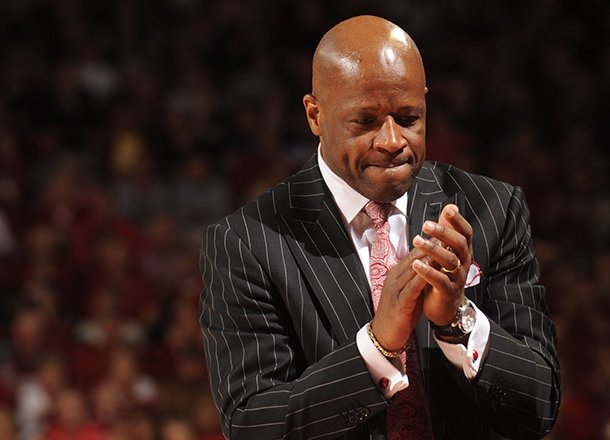FAYETTEVILLE — The years of APR misery are finally over for Arkansas' basketball program.
The Razorbacks had a multi-year score of 951 and a single-year score of 977 for the academic year 2011-12, according to academic progress rate (APR) figures released Tuesday by the NCAA. Both scores are welcomed news for the program, which suffered a scholarship reduction two years ago after repeated years of multi-year rates below the previous NCAA benchmark of 925.
The latest scores reflect the results from the end of Mike Anderson's first full year in charge of the program.
"To see the progression our men's basketball program has made in APR in the past five years in truly remarkable," UA athletics director Jeff Long said. "It was not a short term process and was accomplished only as a result of a strategic and focused plan developed by our academic and coaching staffs, and through the concentrated efforts of men's basketball student-athletes. I am pleased we have positioned our program for future academic success and am confident with the leadership of Coach Anderson we will continue to see measurable academic progress resulting in graduation."
Arkansas had previously been decimated by a 755 single-year APR recorded in the 2007-08 academic year. That score was most impacted by a large group of seniors that left the university without graduating following the season.
What is APR?
Each student-athlete receiving athletically related financial aid earns one retention point for staying in school and one eligibility point for being academically eligible each semester. A team’s total points are divided by points possible and then multiplied by one thousand to equal the team’s Academic Progress Rate score. A perfect score is 1,000.
As a result of the low score in 2007-08, Arkansas had multi-year scores of 888, 886, 892 and 894 in the four previous APR figures prior to the ones released Tuesday.
“It's hard to believe that we’re here," said Jon Fagg, the UA senior associate athletics director for compliance and student-athlete services. "We spent such an incredible amount of time making sure that we finished the job. And when I say ‘we,’ I mean the collective ‘we’ of everybody involved. From student-athletes doing well in the classroom, to staff doing their jobs and coaches buying in and making sure to follow up. It just feels so incredibly gratifying to get where we are.
“I do think it’s a direct reflection of (Mike Anderson). Some of it is the math, certainly, but if you look at what we’re doing, it’s going to continue to translate into strong scores."
Arkansas' latest multi-year score exceeds the new NCAA benchmark by 21 points. Programs will be subject to NCAA postseason bans if they fall below 930 in future years, which could affect their status in conference tournaments as well.
"Some conferences will say ‘if you’re not eligible for the NCAA Tournament, we’re not going to let you play,'" Fagg said. "That may not be true in the SEC, but in some conferences where the only entrant is going to be the automatic qualifier, they may ban a team from the conference tournament."
Anderson, who spent five years at Missouri prior to coming to Arkansas, said he was pleased with the "significant progress in the classroom."
"I appreciate all the efforts made by our administration and academic staff to help provide our student-athletes with the guidance and resources necessary to succeed," Anderson said. "I am proud of our young men who have made the commitment to work in both the classroom and on the court. We will continue to have the expectation within our program that student-athletes work toward graduation while competing for the University of Arkansas as a member of our men's basketball team."
Upon hiring Anderson in April 2011, Long said the coach's track record of APR success was a factor. Anderson's teams at Missouri had strong APR scores above the NCAA benchmark, including a multi-year score of 974 his final year.
"I can’t stress enough that Mike sets a great academic tempo," Fagg said, "just like he is setting a strong athletic tempo."

